Discover Vertical Farming Podcast - Conversations with CEOs, Founders & Leaders in AgTech & CEA
Vertical Farming Podcast - Conversations with CEOs, Founders & Leaders in AgTech & CEA

Vertical Farming Podcast - Conversations with CEOs, Founders & Leaders in AgTech & CEA
Author: Harry Duran
Subscribed: 131Played: 4,682Subscribe
Share
© 2022 FullCast
Description
Vertical farming is a revolutionary approach to produce production leveraging controlled environment agriculture (CEA) technology and systems in innovative ways. It facilitates production of huge quantities of nutritious and quality fresh food without relying on favorable weather, high water usage, skilled labor, and high soil fertility. This ensures reliable yield and consistency in crop production year-round with climate control, and no effects of external environment factors such as diseases, pests, or predator attacks.
Join Harry Duran, Host of the Apple-recommended Podcast Junkies and Founder of FullCast, as he explores the world of controlled-environment agriculture (CEA). Tune in every week for fascinating conversations with CEOs, Founders and luminaries from the exciting and fast-growing world of Vertical Farming.
If you've been interested in the world of Indoor AgTech and want to hear inspiring stories from the innovators on the frontlines of this fast-moving industry, then this most definitely the show for you!
Subscribe and learn more by visiting http://verticalfarmingpodcast.com/
Join Harry Duran, Host of the Apple-recommended Podcast Junkies and Founder of FullCast, as he explores the world of controlled-environment agriculture (CEA). Tune in every week for fascinating conversations with CEOs, Founders and luminaries from the exciting and fast-growing world of Vertical Farming.
If you've been interested in the world of Indoor AgTech and want to hear inspiring stories from the innovators on the frontlines of this fast-moving industry, then this most definitely the show for you!
Subscribe and learn more by visiting http://verticalfarmingpodcast.com/
183 Episodes
Reverse
Ever feel like droughts, rising costs, or feed shortages are always threatening your ranch’s future? I get it—and so does this week’s guest, who’s engineering innovative solutions for resilient, sustainable animal agriculture.In this episode, Harry Duran sits down with Joaquin Gonzalez, Chief Expansion Officer at Eleusis Feed, an expert in agricultural engineering with deep roots (literally) in ranching and hydroponic fodder systems. Raised on a ranch near Santiago and backed by a career spanning Chile, Colorado, and now Texas, Joaquin Gonzalez brings a wealth of hands-on experience and entrepreneurial spirit to revolutionize how livestock are fed.This conversation dives into the power of hydroponic fodder systems as a game-changer for ranchers and farmers battling water scarcity, price hikes, and traditional feed limitations. Joaquin Gonzalez unpacks why modular container farms aren’t always the answer at scale, and shares how Eleusis Feed’s industrial solutions offer flexibility for both small and massive operations, empowering producers in drought-prone regions to ensure feed—and food—security all year long.Beyond the nuts and bolts of fodder systems, you’ll hear stories from Joaquin Gonzalez's lifelong obsession with horses, lessons learned from engineering trial and error, and the realities of transitioning from South America to the U.S. Discover what it really takes to convince traditional ranchers to embrace innovation, and get inspired by the impact of sustainable practices on animal health, water conservation, and rural livelihoods.If you’re ready to learn how vertical farming can safeguard your operation and secure the future of animal agriculture, tune in to this episode now—this one’s packed with practical insights and the passion to match. Listen and get equipped to grow smarter today!Thanks to Our SponsorsCEA Summit East - https://indoor.ag/cea-summit-east-2025/Indoor AgCon - https://indoor.ag/Key Takeaways00:06:42 Tackling Chile’s Drought and the Quest for Sustainable Fodder00:13:01 Engineering Solutions: Container Farms and Overcoming Mold00:19:22 Barley Fodder for All: From Horses to Giraffes00:25:29 Scaling Up: Industrial Hydroponic Fodder Systems00:32:09 Educating Ranchers and Challenging Traditions00:38:18 Entrepreneurship, Moving to Austin, and Staying MotivatedTweetable Quotes"At the end, you have to have horses, you have to have a trainer and all this stuff, and it was something that from there I transitioned to another sport because it was too expensive. Being one of seven, it wasn't something that I was the only one obsessed with horses and stuff, so I pushed that dream aside and focused on other sports. But then after college, I picked it up again, started riding again, won another championship, and it was everything about having a horse and having a train with feed and all this stuff that gets complicated over time. That is something I have in my heart—at some point, I will do it for sure.""The containerized solution that we could put together was able to produce 850 pounds a day, which, if you look at the industry, you can feed 30 cows, 35 horses, and stuff like that. I was talking to many ranchers that had 200 head of cattle, so for that you need eight containers. Putting one container next to another at some point doesn't make sense—maybe two is okay, three you start to think about, no, because every container has its own system, its own way of farming. At the end, we were looking for something more industrial.""With a fodder system, you use about 95% less water than traditional farm. We’re here to help those places, especially...
Ever wondered how to scale your vertical farm without breaking the bank—or your nerves?In this episode of the Vertical Farming Podcast, I sit down with Tristan Fischer, CEO of Fisher Farms, one of the pioneers in modular farming technology. Tristan brings over 25 years of experience in clean energy and large-scale renewables, translating that expertise into creating more efficient, scalable, and cost-effective vertical farming solutions. Having navigated the challenges of building some of the largest vertical farms in the UK, Tristan is passionate about making vertical farming both accessible and sustainable—and he’s got the battle-tested insights to prove it.We dive deep into Fisher Farms’ journey from traditional R&D setups to their cutting-edge modular approach, using shipping containers like building blocks for truly scalable farms. Tristan shares candid stories about the risks and surprises of massive farm construction, and how clever modular design is transforming the economics and flexibility of indoor agriculture, enabling global expansion—even in places like Abu Dhabi, where energy costs are astonishingly low.Beyond technology, we explore Fisher Farms’ culture of innovation, their relentless focus on driving down costs, and why Tristan believes vertical farming should move from premium niche to practical staple for feeding the world. You’ll hear how the team’s values—kindness, respect, factfulness, and robustness—help foster big ideas and quick pivots, and how these principles drive Fisher Farms to be the lowest-cost vertical farm in the world.If you’re ready to rethink what’s possible with vertical farming and discover how modularity might be the answer to your growth headaches, don’t miss this episode! Click play and join us as we explore the future of feeding the world—without wrecking the planet.Ready to stop dreaming and start building a profitable, impactful vertical farm that transcends tired food system models? Click to listen and get inspired by Mary’s story, strategy, and actionable insights!Thanks to Our SponsorsCEA Summit East - https://indoor.ag/cea-summit-east-2025/Indoor AgCon - https://indoor.ag/Key Takeaways00:00 Fisher Farms Expansion and Modular Approach06:01 Overcoming Scaling Challenges at Farm Two12:01 Fisher Farms Ethos and Focus on Cost Reduction18:31 Advancements in Lighting and Efficiency23:40 Competing with Glasshouses and New Market Opportunities29:54 Modular Growth in the UAE and Global Impact35:03 Plug and Play Modular Flexibility40:02 Fisher Farms Technology Certification and Branding46:08 Building an Innovative, Kind, and Robust Company Culture52:42 Closing Reflections and Future OutlookTweetable Quotes"If you have a thousand things which need to get right, I think we probably planned for about 900 of them and got them right, and then once Farm 2 got running, 50 of them were relatively quick to fix, but there were a few items which actually ended up being very, very difficult. Sometimes you had a problem hiding behind another problem.""Our view is that if we focus on really driving down cost, cost, cost, cost, then we don’t have to worry about becoming a premium brand—but it gets us in the direction where we want to be, which is: how do you actually feed the world without trashing the planet at the same time?""What we want is my terrible idea and a genuinely bad idea, and your crazy, insane idea and somebody else’s drug-addled idea or sleep-addled idea—whatever it is—and they’re all actually genuinely bad ideas independently, but by putting those ideas together, layering those...
I’ve lost count of how many times I’ve watched passionate urban farmers burn out because their business model wasn’t sustainable—what if there were a better way?This week on Vertical Farming, I sit down with Mary Wetherill, founding president and CEO of Green Food Solutions, for a candid conversation about building a truly sustainable urban farming business. Mary’s unique journey—from the service industry and massage therapy to pioneering food access solutions in city environments—gives her an unmatched perspective on both the struggles and opportunities vertical farmers face today.In this episode, Mary demystifies how Green Food Solutions is reimagining the food system with a “farming as a service” franchise model that prioritizes support, profitability, and genuine community impact. We dig into what makes a good franchise partner, why most farms face recurring challenges, and how Mary’s mission-driven approach is shaking up the industry’s status quo. If you’ve ever wondered how to make real money in urban farming—without sacrificing your values—this conversation is your playbook.Beyond the business model, you’ll hear stories about navigating Silicon Valley hype cycles, lessons learned from early accelerator programs, the importance of resourcefulness, and the surprising ways personal experience shapes entrepreneurial journeys. Plus, discover how Green Food Solutions fosters partnerships that work, advice for new farmers, and eye-opening discussions on market realities and PR.Ready to stop dreaming and start building a profitable, impactful vertical farm that transcends tired food system models? Click to listen and get inspired by Mary’s story, strategy, and actionable insights!Thanks to Our SponsorsCEA Summit East - https://indoor.ag/cea-summit-east-2025/Indoor AgCon - https://indoor.ag/Key Takeaways00:00 Jersey City Roots and Entrepreneurial Beginnings06:10 Entering Urban Farming & The Square Roots Experience12:35 Green Food Solutions Business Model Explained18:26 Franchising, Farmers, and Fit for New Owners24:57 Green Food Solutions Origin Story & Mission30:22 Monetization, Resourcefulness, and Revenue Streams36:48 Team Management & Leadership Values41:02 Industry Reflections & Farmers’ Challenges46:16 Closing Thoughts & Contact InformationTweetable Quotes"Honestly, when I worked for Merrill Lynch, I quit. I was in with my boss and I was getting a promotion. She brought me in her office and I was just going to give my two weeks. I'd rather stick a pencil in my eyes than take your promotion. I just really didn't like the corporate environment.""We were disgusted by how consultants and all these people were charging tens, twenties of thousands of dollars for things we were giving for free, and honestly, manufacturers usually give those for free—so I didn’t like what I saw happening when I was so originally excited about it.""There was a day that my mom had a box of food that was brought into the house by a priest. I think that was the first day I had an experience of feeling poor, regardless of what level it was. I started selling my toys and shining shoes—I think I got my knowledge about monetization and being resourceful because of having grown up poor."Resources MentionedWebsite - https://www.greenfoodsolutions.comLinkedIn - https://www.linkedin.com/company/18566881 Facebook - a...
Are you worried about potential pathogens lurking in your indoor farm's water system or substrate? I've got you covered with insights from an expert in agricultural analytics.I sat down with Taylor Robinson, Chief Scientist and founder of Rimrock Analytical, to discuss the critical role of proactive monitoring in controlled environment agriculture. Taylor's unique background in molecular sciences and agriculture has positioned him as a leader in providing cutting-edge analytical services to indoor farms.Taylor shed light on the common challenges indoor farmers face, from biofouling in water systems to unexpected pathogen outbreaks. He stressed the importance of having a solid biosecurity plan and regular monitoring to catch issues early. We delved into real-world case studies, including a Pythium outbreak that nearly devastated a farm's operations, and how data-driven solutions helped turn the situation around.We also explored the evolving landscape of indoor farming, discussing the industry's consolidation and the lessons learned from early adopters. Taylor shared valuable insights on how farms of all sizes can benefit from analytical services, emphasizing the return on investment in preventing crop losses. If you're involved in indoor farming or curious about the science behind growing food in controlled environments, this episode is packed with practical knowledge you won't want to miss.Ready to unlock the secrets of maintaining a healthy indoor farm environment? Listen now to gain valuable insights that could save your crops and optimize your growing operations.Thanks to Our SponsorsCEA Summit East - https://indoor.ag/cea-summit-east-2025/Indoor AgCon - https://indoor.ag/Key Takeaways5:03 Water treatment challenges in indoor farming10:31 Proactive monitoring vs. reactive troubleshooting16:23 Education and support for growers22:25 Risks of pathogen spread in grow systems26:50 State of the indoor farming industry31:32 Rimrock team size and recent hires34:36 Importance of preventative maintenance for farmsTweetable Quotes"We take the mantra of 'data to decisions' at Rimrock. We see ourselves as a vehicle to streamline what can be barriers for growers and operators to get the necessary data.""Microbes have the capacity to multiply and spread very rapidly. So keeping a close eye on things, establishing routine monitoring surveys we've found is key.""We're rolling out a microbial heat map to help you better visualize your microbial results mapped to your process flow in your facility. With that you can see potential hotspots for pathogens and how they might integrate to downstream systems."Resources MentionedWebsite - https://rimrockanalytical.com/LinkedIn - https://www.linkedin.com/company/65487487/Instagram - https://www.instagram.com/rimrock_analytical/Connect With UsVFP LinkedIn - https://www.linkedin.com/company/verticalfarmingpodcastVFP Twitter - https://twitter.com/VerticalFarmPodVFP Instagram -
Are you curious about the latest innovations in sustainable agriculture? I recently caught up with Charlie Guy, CEO of Let Us Grow, to discuss the fascinating world of advanced aeroponics and its potential to revolutionize greenhouse farming.Charlie shared insights on Let Us Grow's journey from vertical farming to focusing on aeroponics technology for greenhouses. He explained how their advanced aeroponics system offers significant advantages over traditional hydroponic methods, including increased yields, improved plant health, and reduced water usage. Charlie also touched on the company's expansion into global markets and their efforts to educate both industry professionals and the public about the benefits of controlled environment agriculture.We delved into the challenges faced by the vertical farming industry and how Let Us Grow has adapted to changing market conditions. Charlie emphasized the importance of collaboration within the industry and highlighted their partnerships with established greenhouse builders and system integrators. He also discussed their community outreach efforts, such as the Bristol Basil Company initiative, which demonstrates the potential of local food production using advanced growing techniques.Throughout our conversation, Charlie provided valuable insights into the future of controlled environment agriculture and the role of aeroponics in creating more sustainable and resilient food systems. If you're interested in the intersection of technology and agriculture, or simply curious about where your food comes from, this episode offers a fascinating glimpse into the cutting-edge world of advanced growing methods.Thanks to Our SponsorsCEA Summit East - https://indoor.ag/cea-summit-east-2025/Indoor AgCon - https://indoor.ag/Key Takeaways5:07 Shifting focus to glasshouses and partnerships11:40 Biking to GreenTech conference and industry events16:44 Building relationships with government agencies20:21 Bristol Basil Company and local food initiatives28:12 BBC Radio 4 feature on sustainable growing34:57 Challenges of running a company in this environment39:06 Future plans and global expansion goals44:01 Closing thoughts on collaboration in indoor farmingTweetable Quotes"We've taken the rolling bench architecture widely used in the greenhouse industry and integrated our advanced aeroponics technology into it. This means we can partner with numerous Dutch large greenhouse builders to deliver these systems, providing the smarts while they handle the delivery.""There's no point in doing vertical farming unless it's powered by renewable energy. It doesn't make sense from an environmental standpoint to burn fossil fuels to convert them into electrons to power lights to grow plants when the sun is free.""We're showing you can turn disused greenhouses into productive grows that are profitable and give back to your local food community. You can achieve many of the same outcomes as vertical farming with a slightly lower tech structure like a greenhouse, while still growing the best produce year-round with the least water."Resources MentionedWebsite - www.lettusgrow.com LinkedIn - https://www.linkedin.com/company/lettus-growFacebook - https://www.facebook.com/LettUsGrow/Instagram - a...
Are you struggling to maintain soil health and reduce costs in your indoor farming operation? Soil steaming technology might be the solution you've been searching for.In this episode, I speak with Hans Kristian Westrum, Chief Strategy Manager at Soil Steam, about their innovative soil steaming technology. Hans grew up on a farm in Norway and later pursued a career in business before returning to agriculture. His company, Soil Steam, has developed machines that use steam to sanitize soil and substrates, eliminating harmful pathogens and weeds without chemicals.We discuss how Soil Steam's technology evolved from open field applications to containerized solutions for indoor farming. Hans shares insights on how their machines can effectively treat substrates, allowing farmers to recycle growing media and reduce costs. Recent trials with strawberry growers in Belgium demonstrated that steamed, recycled substrates performed as well as new substrates, opening up exciting possibilities for sustainable farming practices.The conversation also touches on the challenges of balancing different market demands, from construction projects to indoor farms. Hans emphasizes the importance of focusing on containerized solutions to meet the growing needs of indoor farmers worldwide. We explore future plans for expansion into North America and the company's commitment to participating in industry conferences to share their research and technology.If you're curious about innovative solutions for sustainable indoor farming and want to learn how soil steaming technology could revolutionize your growing practices, don't miss this fascinating conversation with Hans Kristian Westrum.Thanks to Our SponsorsCEA Summit East - https://indoor.ag/cea-summit-east-2025/Indoor AgCon - https://indoor.ag/Key Takeaways0:00 Intro: Steaming soil for construction and farming5:13 Early experiences with steam on the farm16:53 Expanding into indoor farming and substrates21:15 Research on steaming to eliminate pathogens27:52 Positive results from substrate recycling tests34:00 Focusing on container-based steaming machines39:02 Closing thoughts and future plansTweetable Quotes"We steam the substrate before they took it in the first time to have control. Be 100% sure that this is clean. These guys cannot take a risk on anything. If you have one disease in that coco coir or whatever you get, if something can happen, it means it comes from Sri Lanka and it can go by boat, what happens all this distance.""We got rid of the harmful organisms that were there and the natural life was back two weeks after. It comes from surroundings, from the soil beneath and stuff like that.""I think it's a fantastic combination. You can talk about sustainability, but if there's no saving money, it's impossible. We say that we can recycle one cube of the substrate at the cost of maybe five to ten dollars. Approximately something between 50 and 60, 70, $80 per cube."Resources MentionedWebsite - http://www.soilsteam.comLinkedIn – https://www.linkedin.com/in/hans-kristian-westrum-12023444/Facebook - https://www.facebook.com/soilsteamConnect With UsVFP LinkedIn -
Have you ever felt overwhelmed by the complexities of applying for agricultural grants? I sat down with Andy Seckinger, Sales Director at United Grants of America, to demystify the process and explore effective sales strategies for farmers and entrepreneurs.Andy's journey from a skeptical view of sales to becoming a passionate advocate for helping others is truly inspiring. He shares how his experiences in Iowa and personal challenges shaped his approach to sales and client relationships. Andy emphasizes the importance of understanding clients' needs, asking the right questions, and maintaining integrity throughout the sales process.We delve into the world of agricultural grants, discussing how United Grants of America assists farmers in navigating complex government programs. Andy explains their team-based approach, which includes compliance experts, analysts, and account executives with farming backgrounds. He highlights the value of personalized service and the company's success-based fee structure.Andy also touches on recent trends in agricultural grants, including changes in government programs and the increasing availability of funding opportunities. His insights provide valuable guidance for farmers looking to secure financial support for their operations.If you're a farmer or entrepreneur seeking to improve your sales skills or explore grant opportunities, this episode is packed with practical advice and inspiring stories. Tune in to gain a fresh perspective on sales, personal growth, and the world of agricultural grants.Thanks to Our SponsorsCEA Summit East - https://indoor.ag/cea-summit-east-2025/Indoor AgCon - https://indoor.ag/Key Takeaways5:02 History and mission of United Grants of America9:16 Andy's journey into sales and professional development14:26 Lessons from stand-up comedy applied to sales19:40 The importance of self-improvement in sales30:59 Overcoming personal struggles and professional growth37:45 How United Grants of America assists farmers42:55 Keys to success in securing agricultural grants46:58 Exploring spirituality and vulnerability in businessTweetable Quotes"At the end of the day, there's three reasons why people buy. Are you going to make me money? Are you going to save me money? You're going to make my life easy.""Life is here to help us. It's up to us not to say bad or good. Life is here to really help us.""I don't think farmers' lives always fit perfectly into what's being offered. So you got to do a little brain surgery and understand what the end is mine and ask really good questions."Resources MentionedAPPLY HERE: https://www.verticalfarmingpodcast.com/grantsWebsite - https://www.unitedgrantsofamerica.com/LinkedIn – https://www.linkedin.com/company/united-grants-of-americaConnect With UsVFP LinkedIn - https://www.linkedin.com/company/verticalfarmingpodcastVFP Twitter - https://twitter.com/VerticalFarmPodVFP Instagram -
Struggling with the complexities of indoor farming and looking for innovative solutions to streamline your operations? Join me as I explore groundbreaking ideas with Marcus Comaschi, R&D engineer at Gyroplant, who is revolutionizing the way we think about plant substrates in controlled environment agriculture.Marcus Comaschi, an R&D engineer at Gyroplant, brings a wealth of knowledge and experience in design and engineering to the world of indoor farming. With a background that spans from working at Ford Motor to developing hydroponic systems, Marcus has a unique perspective on how to innovate within the agricultural sector. His journey from traditional engineering to creating reusable plant-holding superstructures is a testament to his passion for sustainable and efficient farming solutions.The main focus of our conversation is Gyroplant's innovative approach to eliminating traditional substrates in indoor farming. Marcus shares how his company developed reusable silicone rubber superstructures that hold plants without the need for messy, single-use materials. This advancement not only simplifies the growing process but also addresses issues of cleanliness, cost, and supply chain reliability, making it a game-changer for growers worldwide.Beyond the main topic, we delve into the challenges of standardization in the vertical farming industry and the importance of collaboration among growers and technology providers. Marcus also discusses the role of 3D printing in prototyping and developing custom solutions, highlighting how this technology has been pivotal in Gyroplant's success.Curious to learn how Gyroplant's solutions can transform your indoor farming operations? Click to listen and discover how Marcus Comaschi's insights could help you achieve cleaner, more efficient plant production.Thanks to Our SponsorsCEA Summit East - https://indoor.ag/cea-summit-east-2025/Indoor AgCon - https://indoor.ag/Key Takeaways0:00 Intro: Marcus Comaschi joins Vertical Farming podcast5:20 Marcus's journey from engineering to food10:41 3D printing's crucial role in prototyping18:29 Eliminating substrate: Drivers and challenges24:38 Need for standardization in vertical farming31:21 Design process for crop-specific superstructures37:42 Balancing focus and opportunities in business42:39 Closing thoughts on indoor farming's futureTweetable Quotes"We don't like to problem solve, but problem eliminate. Traditionally an engineer solves a problem and creates 20 other problems.""There's this great mesh of the engineered and the organic together in one and that's never going to go to plan initially.""I think the indoor farming world is finding its feet and we really would like to say to people to look at some of our case studies online to see how we slightly disrupted the traditional models."Resources MentionedWebsite - https://www.gyroplant.com/LinkedIn – https://www.linkedin.com/in/marcus-comaschi-05b9327b/?originalSubdomain=ukConnect With UsVFP LinkedIn - https://www.linkedin.com/company/verticalfarmingpodcastVFP Twitter - https://twitter.com/VerticalFarmPodVFP Instagram - a...
Ever wondered why some vertical farms thrive while others struggle? The answer might lie in combining traditional horticultural wisdom with cutting-edge technology.I sat down with Wessel van Paassen, Managing Director at Green Simplicity, to explore the intersection of greenhouse expertise and vertical farming innovation. Born into a family of flower growers, Wessel brings a unique perspective to the vertical farming industry. His company, Green Simplicity, has been at the forefront of developing research chambers and vertical farming solutions for the past decade.Wessel shares how his background in traditional horticulture has shaped his approach to vertical farming. He emphasizes the importance of efficiency, optimization, and practical knowledge in developing successful systems. We discuss the challenges faced by the vertical farming industry and how lessons from greenhouse cultivation can be applied to indoor farming.Our conversation covers a range of topics, including the evolution of vertical farming technology, the importance of collaboration within the industry, and the potential for hybrid approaches that combine greenhouse and indoor farming techniques. Wessel also offers insights into the future of vertical farming and the role of companies like Green Simplicity in driving innovation.If you're interested in the future of agriculture and want to understand how traditional farming wisdom can inform cutting-edge vertical farming solutions, this episode is a must-listen. Tune in to gain valuable insights from one of the industry's most experienced voices.Thanks to Our SponsorsCEA Summit East - https://indoor.ag/cea-summit-east-2025/Indoor AgCon - https://indoor.ag/Key Takeaways5:27 Evolution from research chambers to vertical farms10:30 Pioneering LED lighting in tulip cultivation16:58 Challenges of vertical farming system integration24:40 Attending conferences and industry trends29:45 Green Simplicity joining the GreenV group35:08 Preparing for growth and future innovationsTweetable Quotes"I always say under pressure everything gets fluid. So you have to make sure it works at the ends of the line.""We are not a company that can say, 'Oh, we prove that you can produce 120 kilos of lettuce.' I just say I've never done lettuce. But if you now produce 80 kilos and your climate is this, I know it will be better because our climate is just spot on and we have uniform light distribution.""Seeing is believing. I always say talk to my customer and don't involve me. Then you know the real story."Resources MentionedWebsite - https://greensimplicity.com/en/LinkedIn – https://www.linkedin.com/in/greensimplicity/Connect With UsVFP LinkedIn - https://www.linkedin.com/company/verticalfarmingpodcastVFP Twitter - https://twitter.com/VerticalFarmPodVFP Instagram - https://www.instagram.com/direct/inbox/VFP Facebook - https://www.facebook.com/VerticalFarmPodSubscribe to our newsletters!AgTech
Have you ever wondered how to combine sustainable farming, education, and entertainment into a single innovative concept? I sat down with Mike Smart, founder of Smart Farms, to discuss his unique approach to revolutionizing the food industry and educating the next generation.Mike's journey is a fascinating blend of technology, entrepreneurship, and agriculture. From his early days in crypto and digital payments to his current focus on sustainable farming, Mike has always been driven by a desire to empower individuals and decentralize systems. His latest venture, Smart Farms and the Bucket Buddies brand, is a testament to this vision.At the heart of Mike's concept is the Bucket Buddies book series, which features anthropomorphic characters teaching children about farming, nutrition, and sustainability. But it doesn't stop there – the brand extends to physical products, grow kits, and plans for animated content, all designed to engage children and families in the world of agriculture.We delved into Mike's ambitious plans for scaling his concept, including the development of hyperlocal farms across the country and the creation of educational experiences that blend entertainment with hands-on learning. Mike also shared his thoughts on the challenges of bringing such a multifaceted project to life and his strategies for attracting investors and partners.If you're interested in innovative approaches to sustainable agriculture, education, or building a brand with a purpose, you won't want to miss this inspiring conversation with Mike Smart. Tune in to hear how one entrepreneur is working to transform our relationship with food from the ground up.Thanks to Our SponsorsCEA Summit East - https://indoor.ag/cea-summit-east-2025/Indoor AgCon - https://indoor.ag/Key Takeaways5:35 Crypto journey and payment industry experiences8:14 Origins of indoor farming interest13:44 Creating the Bucket Buddies book series19:33 Walt Disney-like vision for Smart Farms23:52 Current progress and future plans29:14 Scaling the brand and outsourcing production34:53 Immediate needs and ideal partnersTweetable Quotes"How about we funnel all of that consumerism into sustainable farming methods and then scale those sustainable farming methods as a nonprofit as opposed to forcing people to pay taxes to jump on board with whatever systems they can remain centralized and shut us off from our electricity or shut us off from our food supply anytime they want.""Adults are indoctrinated and it's harder and in fact impossible to change the mind of an adult who doesn't want to change their mind. And so it just only makes sense to start with educating the youth, making this stuff entertaining, fun, stickable, addicting.""I'm Daddy in my world and I'm fixing everything I can fix with these processes. And if I can create a subscription service to these micro local hyperlocal farms and instill the curriculum into all the libraries and the schools and homeschool communities so that the kids are learning Smart Farms is where we get our food... Then we're going to be a household name."Resources MentionedWebsite - Https://smartfarms.globalLinkedIn - https://www.linkedin.com/in/mike-smart-bucket-buddiesFacebook - https://www.facebook.com/share/16n455CPLE/X - a...
Have you ever wondered how the vertical farming industry is evolving and what it takes to organize successful events in this space? I had the pleasure of speaking with Tahir Abdul Bari, founder and CEO of TAB Group, about his journey from traditional agriculture to organizing one of the largest vertical farming events in the Middle East.Tahir's story is fascinating, starting from his childhood experiences in Kashmir's apple orchards to becoming a key player in the events industry. He shared how his grandfather's teachings on respecting and valuing people have shaped his leadership style and approach to team building. The conversation delved into the challenges of pivoting during the COVID-19 pandemic and how it led to the creation of the Global Vertical Farming Show.We discussed the importance of adaptability in the events industry, especially when dealing with emerging technologies like vertical farming. Tahir provided insights into how the show has evolved over the years, growing from a virtual event to a large-scale physical exhibition. He emphasized the critical role of collaboration in the indoor farming industry, particularly at this early stage of development.If you're interested in the intersection of agriculture, technology, and event management, or if you want to learn about the latest trends in vertical farming, this episode is a must-listen. Tune in to hear Tahir's valuable perspectives on team building, industry challenges, and the future of indoor agriculture.Thanks to Our SponsorsCEA Summit East - https://indoor.ag/cea-summit-east-2025/Indoor AgCon - https://indoor.ag/Key Takeaways3:42 Impact of COVID-19 on events industry9:15 Building long-term relationships in events16:28 Decision-making process for event viability21:34 Evolution of Global Vertical Farming Show32:15 Unique aspects of upcoming Vertical Farming Show36:38 Importance of team building and culture42:37 Tough questions leaders ask themselvesTweetable Quotes"I am very close to the soil. I grew up in a family with farms and orchards. That's what we did on the ground level. So I had a natural inclination towards agriculture.""For Middle East, especially UAE, vertical farming is not just an option for people to consider. It's something which is by default the best that they can do.""A client is a client until we are closing a deal. Once the deal is closed and you come to the event, treat them as your guests. It's our responsibility to make their life comfortable."Resources MentionedLinkedIn - https://www.linkedin.com/in/tahirabdulbari/Connect With UsVFP LinkedIn - https://www.linkedin.com/company/verticalfarmingpodcastVFP Twitter - https://twitter.com/VerticalFarmPodVFP Instagram - https://www.instagram.com/direct/inbox/VFP Facebook - https://www.facebook.com/VerticalFarmPodSubscribe to our newsletters!AgTech Digest - https://agtechdigest.comThe Indoor Farmer -
Are you struggling to find sustainable solutions for your crops in an ever-changing agricultural landscape?I sat down with Jessica Staha, CEO of LPC Naturals, to discuss the fascinating world of microbials in agriculture. With a background in molecular biology and genetics, Jessica brings a wealth of knowledge to the table, having worked in various industries before finding her passion in agricultural technology.We delved into the unique challenges faced by both indoor and outdoor farming, and how microbials can provide innovative solutions. Jessica explained how their proprietary isolate of Beauveria bassiana works as a plant stimulant, helping crops withstand various stresses. She emphasized the importance of educating farmers and growers about the benefits of microbials, as they offer a more holistic approach to plant health compared to traditional chemical solutions.Throughout our conversation, we touched on the evolving landscape of controlled environment agriculture, the impact of extreme weather on farming, and the potential for collaboration within the industry. Jessica shared insights on leadership in a startup environment and the importance of maintaining work-life balance in the fast-paced world of agricultural innovation.If you're curious about the future of farming and how microbials could revolutionize crop management, this episode is a must-listen. Tune in to gain valuable insights from an industry expert and discover how these tiny organisms could make a big difference in agriculture.Thanks to Our SponsorsCEA Summit East - https://indoor.ag/cea-summit-east-2025/Indoor AgCon - https://indoor.ag/Key Takeaways5:57 From corporate to entrepreneurship challenges11:47 LPC Naturals origin and microbial solutions17:57 Educating farmers on microbial benefits24:59 Preparing environments for microbial use30:20 Balancing entrepreneurship and personal well-being35:17 Collaboration opportunities in microbial researchTweetable Quotes"DNA is DNA is DNA. It doesn't matter the organism. And so again, it's this universal language that you can communicate with.""In a controlled sector, you're really pushing those plants to an extreme. Really fast cycle times, beautiful, consistent responses are needed. And then on top of it, packaging, handling, long shelf lives are needed.""As more chemicals are being pulled and aren't being allowed to be used, it's clear that more people are doing a better job at communicating the efficacy of microbials in agriculture and vertical spaces."Resources MentionedWebsite - https://lpcnaturals.com/LinkedIn - https://www.linkedin.com/in/jessica-stahaInstagram - https://www.instagram.com/primesuperiorgrow/Facebook - https://www.facebook.com/primesuperiorgrowYouTube - https://www.youtube.com/@primesuperiorgrowConnect With UsVFP LinkedIn - https://www.linkedin.com/company/verticalfarmingpodcastVFP Twitter -
Have you ever wondered how plants adapt to extreme conditions without the ability to move? I've always been fascinated by the resilience of plants, and in this conversation with Alberto Campanaro, we explore the intricate world of plant science and its applications in modern agriculture.Alberto Campanaro, Head of Science at Zayndu, brings a wealth of experience from his background in industrial biotechnology and plant research. His journey from traditional open-field agriculture to innovative seed treatment technology offers valuable insights into the evolving landscape of controlled environment agriculture. Alberto's passion for understanding plant behavior and his transition from academia to a startup environment provides a unique perspective on the challenges and opportunities in this field.The heart of our discussion revolves around Zayndu's cold plasma technology for seed treatment. Alberto explains how this innovative approach can enhance seed germination, improve plant growth rates, and potentially increase crop yields. We delve into the intricacies of developing "recipes" for different plant species and varieties, highlighting the precision required in this cutting-edge technology.We also touch on the broader implications of this technology for sustainable agriculture, the importance of maintaining a connection with plants in scientific work, and the challenges of transitioning from hands-on research to a management role in a growing company. Alberto's insights offer a glimpse into the future of agriculture and the potential for technology to address global food production challenges.If you're curious about the intersection of plant science, technology, and sustainable agriculture, this episode offers a fascinating look into the future of food production. Tune in to gain a deeper understanding of how innovative approaches like cold plasma treatment are shaping the way we grow our food.Thanks to Our SponsorsCEA Summit East - https://indoor.ag/cea-summit-east-2025/Indoor AgCon - https://indoor.ag/Key Takeaways0:00 Intro: Plants' resilience without movement5:43 Growing up in Italy and family memories11:48 Journey to plant science and UK studies17:40 Transition to controlled environment agriculture22:47 Discovering Zayndu and startup excitement34:42 Crop-specific responses to cold plasma treatment38:38 A day in the life of a plant scientist42:40 Evolving from scientist to team leader47:27 Closing thoughts and contact informationTweetable Quotes"One thing I always find fascinating is that actually plants cannot move. Throughout the year these organisms have to resist heat waves, floods, different temperatures... And mammals or animals can move around, right? There's no water. Okay, let's go find it. But for plants, they're not allowed to.""I always remember I was coming from a kind of a rich subgroup with flashy equipment and stuff. And I was there, I thought, you know, this is quite interesting, I can do this. It was also, you know, the technology was sound and at that time, and still I was looking for do something of impact.""We have arrived to certain level of detail. For example, take spinach that we study quite a lot because there's a lot of request in the market for us for spinach to improve it. And we can see this variation response at the level of varieties. So we are at the moment, in terms of plasma protocol, we have three of them and these three, depending on which variety you're growing, you need to go 1, 2 or 3."Resources MentionedWebsite -
Are you struggling to optimize your greenhouse operations and maximize crop yields? I recently spoke with Dima Chernobilsky, co-founder and CEO of GrowDirector, who shared groundbreaking insights on greenhouse automation and the future of controlled environment agriculture.Dima's journey from finance to agriculture is a testament to the power of curiosity and perseverance. With a background spanning real estate, business development, and agriculture in various parts of the world, Dima brings a unique perspective to the field of greenhouse automation. His company, GrowDirector, has evolved through four generations of technology, each iteration addressing specific challenges in the industry.The conversation centered on GrowDirector's innovative approach to greenhouse automation. Dima explained how their wireless, modular, and scalable system provides growers with unprecedented control and flexibility. The latest generation of their technology offers future-proof scalability, allowing growers to expand their capabilities without significant additional investment.We also explored the role of AI in agriculture, discussing GrowDirector's AI-powered features such as predictive analytics and agronomic advice. Dima shared insights on the challenges of vertical farming, the importance of crop selection, and the need for patience as technology continues to evolve. His advice for the industry emphasized the importance of careful planning and adaptability in the face of rapid technological change.If you're interested in the cutting edge of greenhouse technology and want to learn how AI is revolutionizing agriculture, this episode is a must-listen. Tune in to hear Dima's fascinating journey and gain valuable insights that could transform your approach to controlled environment agriculture.Thanks to Our SponsorsCEA Summit East - https://indoor.ag/cea-summit-east-2025/Indoor AgCon - https://indoor.ag/Key Takeaways5:18 Evolution of GrowDirector's product generations10:03 Challenges faced by greenhouses and indoor farms14:36 AI integration in greenhouse management29:57 Lessons learned in hiring and leadership35:38 Future goals for GrowDirector's growthTweetable Quotes"We are the god in the greenhouse. We control all of your equipment automatically. Our AI can even predict problems which are coming into the greenhouse and change the rules with your permission.""Hire slow, fire fast. I do think this is the thing because every time I gave a second chance it didn't work for me.""Be very picky about what you do. Not everything you can grow, you can sell, and not everything you can sell you can make money from. Finally you need to make money because you need to feed yourself, your family, and sometimes also get money to your investors."Resources MentionedWebsite - www.growdirector.com LinkedIn - https://www.linkedin.com/in/dimacher/YouTube - https://www.youtube.com/@growdirector8723 Facebook - https://www.facebook.com/growdirectorltdInstagram - https://www.instagram.com/growdirectoragri/X -
Ever wondered why so many indoor farming ventures fail despite the hype? I've got the inside scoop from a true industry veteran.Glenn Behrman, founder and president of CEA Advisors, brings over 50 years of experience in horticulture and indoor farming to our conversation. From his early days in the foliage industry to pioneering container farming, Glenn's journey is a testament to resilience and adaptability in a rapidly evolving field.I delved into Glenn's perspective on the current state of indoor farming, exploring the challenges faced by newcomers and established players alike. He emphasizes the importance of a realistic, business-focused approach, cautioning against the pitfalls of easy money and unrealistic expectations that have plagued the industry.We also discussed the potential opportunities in custom projects, the limitations of container farming, and the need for honesty and integrity in the industry. Glenn's insights on the recent demise of prominent indoor farming companies offer valuable lessons for anyone considering entering this space.If you're curious about the real challenges and opportunities in indoor farming, straight from someone who's seen it all, this episode is a must-listen. Tune in for a no-nonsense look at what it really takes to succeed in this complex and evolving industry.Thanks to Our SponsorsCEA Summit East - https://indoor.ag/cea-summit-east-2025/Indoor AgCon - https://indoor.ag/Key Takeaways5:55 Glenn's journey into vertical farming27:48 Evolution of container shipping business41:33 Automation and robotics in agriculture47:35 Innovative ideas for container farming54:05 Lessons from recent industry bankruptciesTweetable Quotes"I have a life that people only dream about. I've had the highest highs and the lowest lows, but I just kept on putting one foot in front of the other.""It's all a giant spreadsheet. Every facet of this industry is an Excel spreadsheet. On the left hand side you put all of the different exigencies. And then you have to make adjustments along the right hand side to get to that sweet spot.""If somebody decides to go into this business, I think the first thing they need to do is go sit in a room by yourself and ask yourself, why am I doing this? If your response is for the money, don't do it. This is not a throw the money in and take the money to the bank. It just doesn't work that way."Resources MentionedWebsite - https://cea-advisors.com/LinkedIn - https://www.linkedin.com/in/glennbehrman/Connect With UsVFP LinkedIn - https://www.linkedin.com/company/verticalfarmingpodcastVFP Twitter - https://twitter.com/VerticalFarmPodVFP Instagram - https://www.instagram.com/direct/inbox/VFP Facebook - https://www.facebook.com/VerticalFarmPodSubscribe to our newsletters!AgTech Digest - https://agtechdigest.comThe Indoor Farmer - a...
Ever wondered how a seasoned executive from the oil and gas industry ends up leading a vertical farming startup? I sat down with Michael Oster, CEO of Saffron Tech, to explore this fascinating journey.Michael's transition from the corporate world to the innovative field of vertical farming is a testament to adaptability in business. With decades of experience in oil and gas, real estate, and M&A, he brings a unique perspective to Saffron Tech. The company is pioneering the indoor cultivation of saffron, the world's most expensive spice, with potential applications ranging from culinary use to pharmaceuticals.We delved into the challenges of scaling up startups, particularly in the agricultural technology sector. Michael emphasized the importance of careful planning, realistic financial modeling, and securing off-take agreements before major investments. He shared valuable insights on balancing ambitious goals with practical considerations, drawing from both successes and setbacks in his career.Our conversation also touched on the geopolitical implications of saffron production, the potential for saffron-based pharmaceuticals, and the intricacies of building a commercial-scale vertical farm. Michael's leadership style, focused on leading by example and leveraging a small but highly skilled team, offers a blueprint for startup success in challenging industries.Curious about the intersection of traditional business acumen and cutting-edge agricultural technology? Listen to this episode to gain invaluable insights from a leader who's bridging these worlds and revolutionizing saffron production.Thanks to Our SponsorsCEA Summit East - https://indoor.ag/cea-summit-east-2025/Indoor AgCon - https://indoor.ag/Key Takeaways5:03 Board member roles and responsibilities explained8:08 Saffron's unique properties and market potential14:00 Challenges of scaling up agricultural startups17:35 Balancing passion and practicality in business21:42 Learning from failed real estate project26:47 Mitigating risks in high-risk venturesTweetable Quotes"Just to give you a perspective, you need 120,000 flowers growing to create £2 or a kilo of dry saffron. That's a lot of space. That's a lot of flowers.""We're producing the highest quality of saffron if you compare it to the different bands. In all categories of the active ingredients, we're producing a higher quality than the top notch saffron.""We're in a business that has high risk by design. The last thing you want to do is add to that with bullish assumptions. So we try to minimize them in a way that we'll have room for some failure and still be very successful."Resources MentionedWebsite - https://saffron-tech.ag/ LinkedIn - https://www.linkedin.com/in/michaeloster01/Connect With UsVFP LinkedIn - https://www.linkedin.com/company/verticalfarmingpodcastVFP Twitter - https://twitter.com/VerticalFarmPodVFP Instagram - https://www.instagram.com/direct/inbox/VFP Facebook -
Ever wondered how indoor farming is revolutionizing the way we connect with our food? I sat down with Marc Oshima, CEO of Babylon Microfarms, to explore the cutting edge of sustainable agriculture.Marc Oshima brings over 30 years of experience in driving large-scale commercial businesses, including co-founding AeroFarms. Now at the helm of Babylon Microfarms, he's spearheading innovative solutions in B2B indoor farming across healthcare, corporate dining, hospitality, and education sectors.In this episode, we dive deep into how Babylon Microfarms is bringing the farm directly to customers, fostering a greater connection between people and their food. Marc shares insights on the company's success in increasing leafy green consumption by 35% in senior care facilities and their expansion to over 350 farms across five countries.We also discuss the evolution of the indoor farming industry, the importance of customer feedback, and how Babylon Microfarms is preserving cultural heritage through locally grown, culturally relevant produce. Marc offers valuable lessons on business fundamentals and the power of focus in scaling a successful AgTech company. Ready to discover how indoor farming is reshaping our relationship with food and transforming industries? Tune in to this episode for a fascinating glimpse into the future of sustainable agriculture.Thanks to Our SponsorsCEA Summit East - https://indoor.ag/cea-summit-east-2025/Indoor AgCon - https://indoor.ag/Key Takeaways5:07 Babylon Microfarms' focus on key verticals10:40 Surprising installations and high-profile customers 16:19 Lessons from early industry struggles21:53 Listening to customers and adapting strategies27:17 Workforce development in indoor farming33:40 Cultural connections through locally grown food37:18 CEA Alliance's role in industry advocacyTweetable Quotes"We're seeing amazing use cases that we might not even have thought about. We were at this conference last week, and this fantastic operator chef was telling us how they've got the mint planted for the mint juleps for Kentucky Derby next week, and then they have the cilantro already planted and ready for Cinco de Mayo.""Understanding what business you're in, understanding the economics of your business, and appreciating how your technology can uniquely solve some of these challenges. I think that's core when you think about what's worked, what hasn't worked.""We have units cruising the world on cruise ships, literally cruising on cruise ships. It gives you a sense of the autonomy, the self-autonomous aspect and how resilient the farming approach is."Resources MentionedWebsite - https://babylonmicrofarms.com/LinkedIn - https://www.linkedin.com/in/marcoshima/Connect With UsVFP LinkedIn - https://www.linkedin.com/company/verticalfarmingpodcastVFP Twitter - https://twitter.com/VerticalFarmPodVFP Instagram - https://www.instagram.com/direct/inbox/VFP Facebook -
Ever wondered how a mushroom farm could revolutionize the food industry? I sat down with John James Staniszewski, the creator of the fungitarian lifestyle and a pioneer in the vertical farming space, to uncover the secrets of his success.John's journey from nightclub manager to mushroom mogul is as fascinating as it is inspiring. He shares how he built a thriving mushroom farm from scratch, producing up to 35,000 pounds of mushrooms per month and supplying over 350 grocery stores.In this episode, we dive deep into the challenges of starting a vertical farm, the importance of hands-on leadership, and John's vision for creating 10 million fungitarians by 2027. John reveals how his past experiences in bodybuilding and personal training shaped his approach to the mushroom industry.We also explore the parallels between vertical farming and bodybuilding, the potential of mushrooms in addressing childhood health issues, and John's upcoming launch of bioavailable mushroom tinctures and gummies.If you're curious about the future of food, the potential of mushrooms, or how to build a successful vertical farming business, this episode is a must-listen. Tune in to gain insights from a true innovator in the field.Thanks to Our SponsorsCEA Summit East - https://indoor.ag/cea-summit-east-2025/Indoor AgCon - https://indoor.ag/Key Takeaways5:42 Transition from nightclub scene to bodybuilding11:15 Spiritual journey and discovery of magic mushrooms16:59 Building a mushroom farm22:31 Challenges of vertical farming and industry insights28:15 Developing fungitarian food products and business growth39:33 Current business operations and partnerships45:46 Defining success: Goal of 10 million fungitarians by 202750:57 Leadership growth and employee management strategiesTweetable Quotes"I've always been a weirdo, so in all reality it was for me I've been on this like universal timeline where all the things that I want to embody and do have just been ahead of time.""I believe that I have the opportunity, which you don't get in another lifetime, to be able to gear people towards a new food.""I'd rather have somebody that knows nothing and wants to learn everything than somebody who thinks they know everything."Resources MentionedWebsite - https://windycitymushroom.com/LinkedIn - https://www.linkedin.com/in/john-james-staniszewski-0728312ab/Connect With UsVFP LinkedIn - https://www.linkedin.com/company/verticalfarmingpodcastVFP Twitter - https://twitter.com/VerticalFarmPodVFP Instagram - https://www.instagram.com/direct/inbox/VFP Facebook - https://www.facebook.com/VerticalFarmPodSubscribe to our newsletters!AgTech Digest - https://agtechdigest.comThe Indoor Farmer -
Ever wondered how automation is shaping the future of indoor farming? In this episode, I speak with Renko Schuil, Sales Manager of Indoor Farming at TTA ISO, a leading company in horticultural automation. With over 25 years of experience in the industry, Renko offers invaluable insights into the evolving world of vertical farming and controlled environment agriculture.We dive deep into the challenges and opportunities facing the indoor farming sector, discussing everything from market dynamics to technological advancements. Renko shares his perspective on the importance of knowing your market, the potential of hybrid growing systems, and the critical role of automation in scaling up operations.Throughout our conversation, we explore the global landscape of indoor farming, touching on regional differences, emerging crop varieties, and the delicate balance between innovation and practicality. Renko also offers candid advice for newcomers to the industry, emphasizing the importance of collaboration and forward-thinking.If you're curious about the future of food production and want to hear from an industry veteran, this episode is a must-listen. Tune in to gain valuable insights that could shape your understanding of indoor farming and its potential to revolutionize agriculture.Thanks to Our SponsorsCEA Summit East - https://indoor.ag/cea-summit-east-2025/Indoor AgCon - https://indoor.ag/Key Takeaways5:14 Renko's extensive experience in horticulture industry10:47 Shift in sentiment towards vertical farming15:50 Origins and growth of TTA company20:13 Renko's role and responsibilities at TTA-ISO25:59 Common mistakes in vertical farming projects31:45 Regional differences in vertical farming needs36:53 TTA's approach to new crop automation requests41:46 Balancing advice and business opportunitiesTweetable Quotes"I think there's a market for vertical farming for sure, because otherwise I wouldn't be so enthusiastic about it.""Make a choice. Are you a tech company or a grower? Know your market.""Think ahead. Even if you're not ready for automation or high capacity equipment yet, get into talks with automation companies. It can save you a lot of time and money when you have to change certain things in your company in the future."Resources MentionedWebsite - www.tta.euLinkedIn - https://www.linkedin.com/in/renkoschuil/Connect With UsVFP LinkedIn - https://www.linkedin.com/company/verticalfarmingpodcastVFP Twitter - https://twitter.com/VerticalFarmPodVFP Instagram - https://www.instagram.com/direct/inbox/VFP Facebook - https://www.facebook.com/VerticalFarmPodSubscribe to our newsletters!AgTech Digest - https://agtechdigest.comThe Indoor Farmer - https://www.indoorverticalfarm.com/Horti-Gen Insights - a...
Ever wondered how to navigate the challenges of indoor farming and create successful products in this evolving industry? Oliver Rotko, CEO of Plant TUI and Arctic Farming, shares his journey and insights into the world of vertical farming.I sat down with Oliver to discuss his unique path from business student to indoor farming innovator. He revealed how his experiences in B2B sales, marketing, and even watchmaking contributed to his success in developing cutting-edge vertical farming solutions. Oliver's story is a testament to the power of patience, market research, and customer-centric product development.We delved into the development of Arctic Farming's flagship product, Herbie, a sleek and efficient indoor farming unit designed for the hospitality industry. Oliver explained the careful considerations behind its design, from the choice of materials to the user interface, all informed by extensive customer feedback and market testing. He also shared insights into the company's expansion into the consumer market with the acquisition of Plantui, a award-winning desktop hydroponic system.Throughout our conversation, Oliver emphasized the importance of taking a measured approach to growth in the vertical farming industry. He highlighted the need for patience, both from investors and entrepreneurs, and the value of learning from industry failures. We also touched on Arctic Farming's exciting ventures into space agriculture and the company's unique "Earth first, space second" strategy.If you're interested in the future of food production, sustainable agriculture, or entrepreneurship in emerging industries, you won't want to miss this insightful conversation with Oliver Rotko. Tune in to gain valuable lessons from a leader at the forefront of indoor farming innovation.Thanks to Our SponsorsCEA Summit East - https://indoor.ag/cea-summit-east-2025/Indoor AgCon - https://indoor.ag/Key Takeaways5:53 Importance of video marketing for CEOs13:30 AI tools revolutionizing content creation16:19 Early days of Arctic Farming development 21:53 Herbie: Innovative restaurant-grade vertical farm27:41 Switching from aeroponics to fogponics34:53 Space ambitions and Earth-first strategy37:52 Acquiring Plantui: Consumer-focused hydroponic system43:18 Motivation behind pursuing indoor farmingTweetable Quotes"We've taken it incredibly slow, gathering feedback, meanwhile seeing all these bankruptcies, for example, from infarm, learning from them, interviewing the insiders, interviewing their ex investors, interviewing their customer suppliers and so on, and kind of feeding all of that information and learnings from the customers, from the industry, from experts like you back into the product.""Why do we do this? To be honest, I had a wonderful conversation with a colleague from the US where the standard greeting that we have is, how are you doing? Fine, thank you. And as well as you can do as an indoor farming startup or entrepreneur, it's. This is the most difficult industry that I can imagine getting into.""Just seeing the iterative progress with a product that you have designed from zero, literally scratch, is the most rewarding feeling that you can have."Resources MentionedWebsite - https://www.arcticfarming.io/LinkedIn - https://www.linkedin.com/in/oliverrotko/Connect With UsVFP LinkedIn - a...


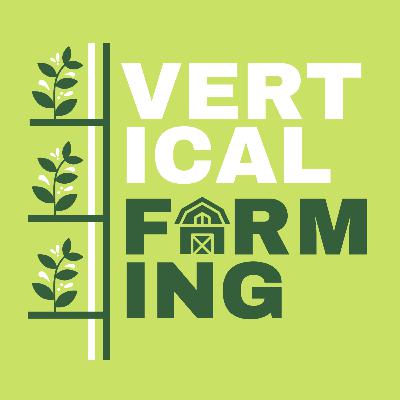
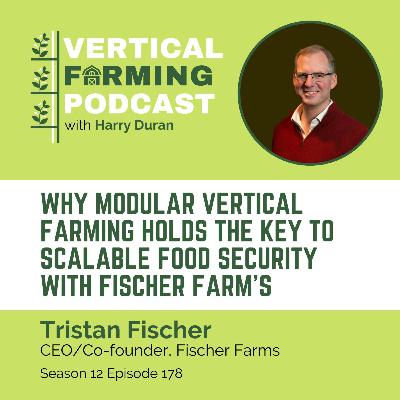
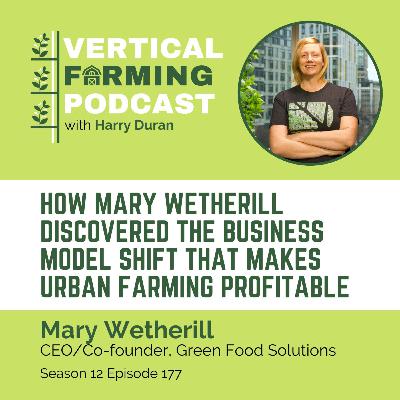
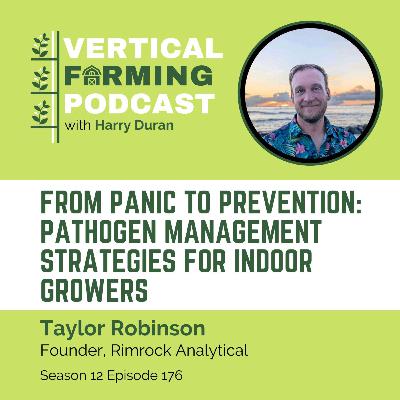
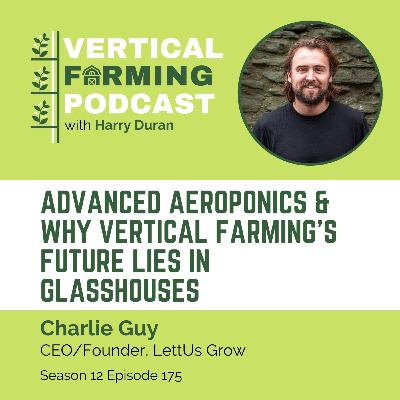

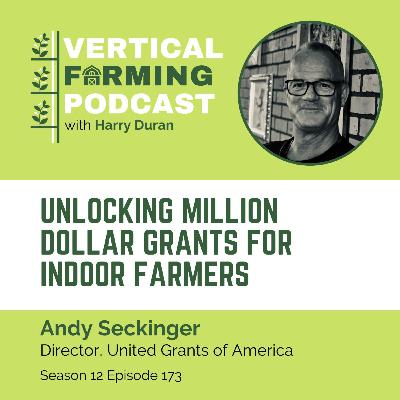

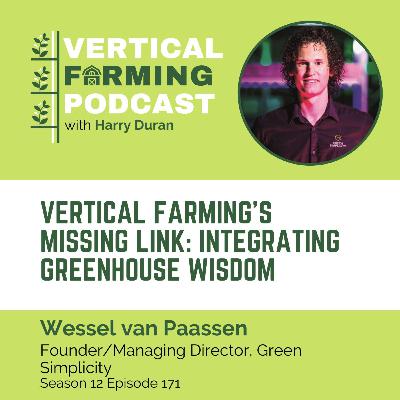
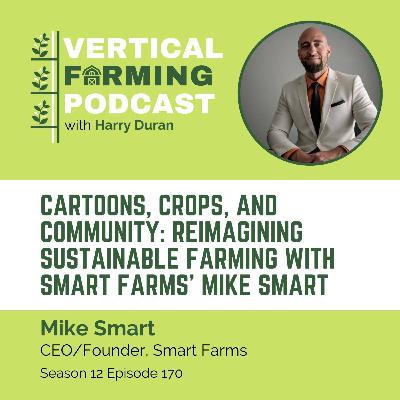
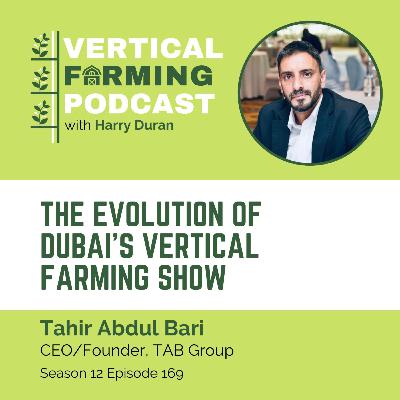
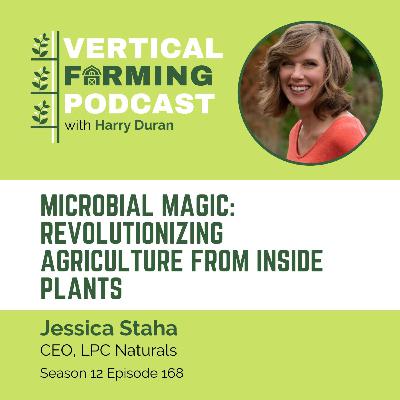
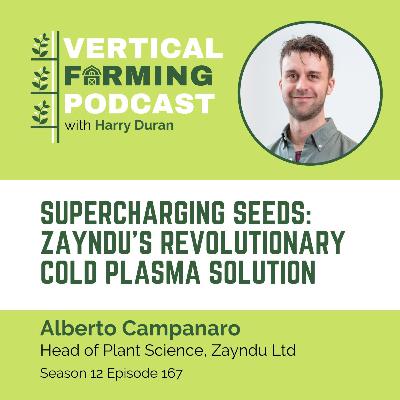
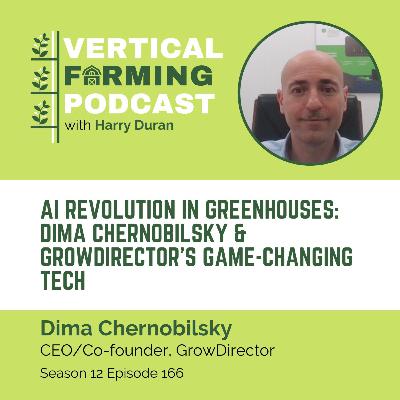
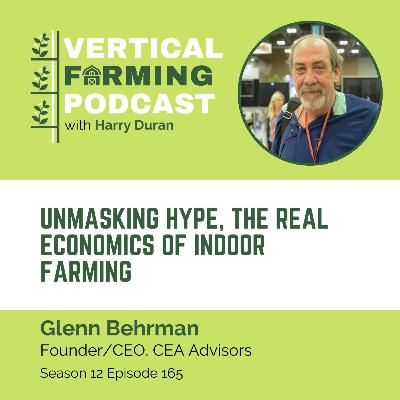

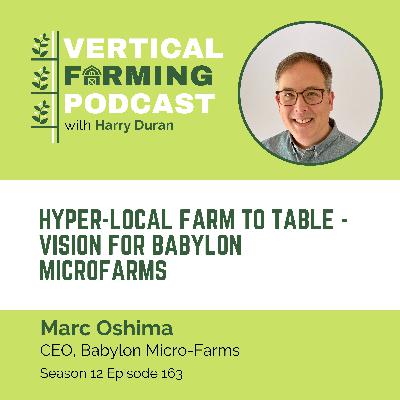
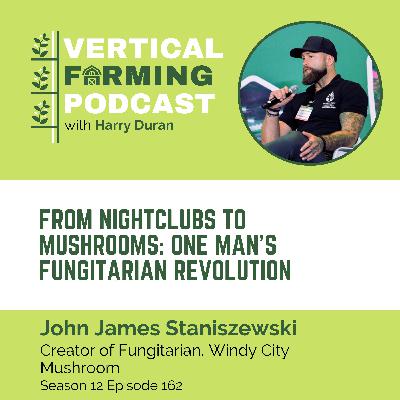
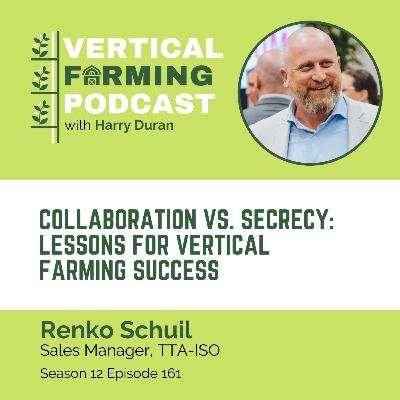




I used to be an avid listener to this podcast and enjoyed it very much minus Harry himself. one star rating ⭐ Harry likes reducing his guests to their race and gender over their contributions to the AG tech space. He brings on fantastic guests minus episode 61. Harry never dives deep enough into the science of vertical farming but would rather focus on consensus stats. Harry loves mentioning every episode that he grew up in Yonkers and is El Salvadorian but has the voice of a privilege white Man
Not sure what happened, my download is only 12:48, so it cuts off the interview early and jumps to the closing remarks.